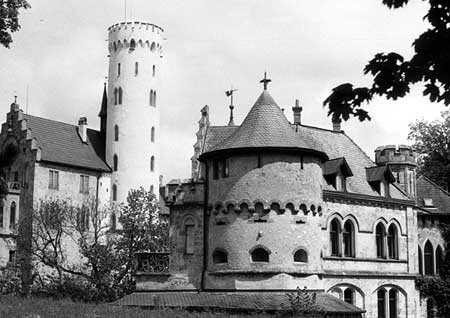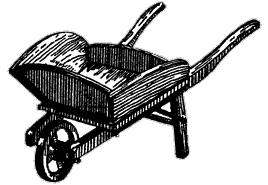The
People's Kingdom
of
Potsderania

|
A small nation located between Lithuania, Belarus and Poland, Potsderania with a population of 25 522, is one of Europe's smallest nations along with Liechtenstein, Monaco, Andorre or Luxemburg. It is also the world's only marxist-leninist kingdom as King Olaf the Ninth, a passionately socially inclined ruler, enthralled by the ideas of Karl Marx and a close friend of Leon Trotsky, decided in 1912 to turn governance over to the people. He founded the PCP (Potsderanian Communist Party) and assumed a solely representative role as king and that of a simple citizen politically. Well loved by his fellow potsderanians, he was never overthrown and his son Olaf the Tenth succeeded him in 1975 (officially only in 1991) followed in 1999 by the actual reigning queen Olga the First. A long time a vacation resort for communist era dignitaries, thanks to its spas on the Gulev river and picturesque mountainous assets, Potsderania is also famous for its University, located in the capital Triplotz, a historical place of science and learning renowned internationally for its paranormal and psychic departments. |



Triplotz, capital of Potsderania


Location of Potsderania
| -
Capital: Triplotz |
| History | ||
Founded
in 1522 in north-eastern Europe, by Olaf the First a travelling nobleman
and scholar and self proclaimed monarch of swedish descent, Potsderania
has remained, like it's western counterparts Liechtenstein or Monaco,
a small and discreet independent nation. It's unique location in a secluded
mountain valley has kept it safe from invasions, wars, plagues or any
other of history's awful surprises. From the first the Potsderanian monarchy showed friendship and support to scientists and inventors, a tradition initiated by Olaf the First himself, inventor of the wheelbarrow and expert astronomist. Later pursued by his descendants, this marriage with science led to the creation in 1823 of the University of Potsderania at Triplotz, still famous today for it's breakthrough discoveries in the field of paranormal science. This special interest for the paranormal was initiated in 1862 by Olaf the Eight who made it a personal goal to rediscover the ancient secrets of the Egyptians namely the science of telekinesis, which he firmly believed to be the technique used by the ancient civilisation to build their mysterious pyramids. Until the 20th century the nation's secluded geographical location and it's monarch's choice to keep the affairs of the world at bay, led to a scarceness of major historical events, the quiet kingdom passing through centuries undisturbed, the most notable events being royal weddings, jubilees and other popular ceremonies, to which the potsderanian people participate willingly with much enthusiasm, being prone to celebrations of all sorts. In 1912, showing a great sense of history, Olaf the Ninth, abandoned supreme political power, and created The People's Kingdom of Potsderania, soon to be followed by Russia and the Soviet Union. He created the PCP (Potsderanian Communist Party) and surrendered all his inherited political powers to an elected assembly of the people. The Potsderanian People's Kingdom proved to be very different from it's soviet neighbour. The minute population (today counting only 25 000 people), the geographic isolation, the rich agricultural resources and most of all the wisdom and true concern of it's rulers made Potsderania a haven of peace and well-being for it's inhabitants. As small as it was, the country finally attracted the attention of it's soviet neighbour under Josef Stalin who after first invading it in 1937, chose to only change it's name to People's Republic of Potsderania and to leave it be, to be used as a secret vacation destination for nomenklatura bosses. The King, having proved himself a devote socialist, was left free to live on as a simple citizen. During World War II, like Attila and Napoleon before him, Hitler and his nazi forces completely neglected Potsderania and apart from a few skirmishes at the Baderna border post with rogue german soldiers fleeing the russian advance in 1944, the small nation was left unscathed by the horrors of that era. During the fifties and sixties, the Gulev river spas and the curative virtues of it's clear mountain waters attracted many apparatchiks from the Soviet Union and other communist states and Triplotz's University of Potsderania became a much sought after place of learning and research for paranormal scientists from the eastern block. This ensured generous funding from the Soviet Ministry of Science until the end of the eighties and of the Soviet Union. In 1990 a quasi unanimous referendum reinstated the appellation People's Kingdom of Potsderania and returned the throne to the royal family, at that time in the person of Olaf the Tenth. Today, under Queen Olga the First, Potsderania thrives on, untouched by history's quakes, and apart from a few recent economic problems, it is still a pleasant and happy nation where people know and enjoy the true value of life. |
||
|
King
Olaf the First, |
||
|
Geography |
||
A
wide valley surrounded by mountains, Potsderania is crossed by the Gulev
river, an affluent of the Western Bug River. Located between Belarus,
Lithuania and Poland, Potsderania is divided into three counties, Valley
county, Eastern Mountain county and Western mountain county. The highest
summit is Mons Olaf at 2627m. |
||
|
Economy |
||
|
Mostly agricultural, Potsderania is further enriched by technological patents from its university research labs, the Gulev river's curative waters and the popularity of its hydrotherapy centers such as the Zhopasveytu Spa, and a thriving traditionnal wheelbarrow industry. |
||
|
Transport |
||
| Road
only. No airports or train stations. In no way luddites, Potsderanians
prefer that their tranquil nation remain hard to reach, thus avoiding most of history's turmoils."We're out of the way and so shall we stay" King Olaf the Third used to say. |
||
|
Culture |
||
| Similar to most of Europe, with a prevalence for the occult, many Potsderanians are keen practitioners of spiritism, spoon bending and telepathy. In 2010, using the University of Potsderania's newly invented Quantic Camera, the documentary Planet of the Mandelbulbs gained international acclaim and attention. | ||
|
Sports |
||
|
Wheelbarrow racing is highly popular. The national yearly championship in Künztdamm attracts competitors and spectators from all three counties. Seasonal skiing on Mons Olaf. |
||
Places of Interest |
||
| - The University of Potsderania in Triplotz | ||
 |
 |
|
| Located
in Triplotz, the Potsderanian capital, the University of Potsderania
is specialised in paranormal phenomena such as levitation, telepathy,
telekinesis, mediumnic powers etc. Founded in 1823 by King Olaf the
Sixth, it specialised in the paranormal and psychic sciences in 1862
under King Olaf the Eighth. In the beginning of the 20th century it
became one of the leading research centers in paranormal science. Its
laboratories were the place to be for eastern block scientists working
in these fields before the collapse of the wall. Today, due to lack
of soviet funding, activity has slowed down and students and teachers
sadly must often go abroad to pursue their research. It is in this university,
in professor Edvaard Azelik's famous Psychic
Energy Lab, the L.E.P., that in the late 1980's two young Professors,
Uri Flach and Ferënc Vroëgop, were the first to establish
the existence of
quanta-cathodic hertzian viruses. More recently in 2009, Professor
Flach made another major scientific breakthrough at the L.E.P. with
his invention of the Quantic Camera, financed for a great part by foreign
investors, a revolutionary camera that was used to make the highly acclaimed
space documentary Planet
of the Mandelbulbs. |
||
|
Schloss Olafhus
|
||
|
The Mausoleum of Olaf VIII
|
||
|
Zhopasveytu Spa
|
||
|
Kuntzdamm Wheelbarrow Racing Championship
|
||
| The english version of the Serpenski-Lucien, the official Traveller's Guide to Potsderania is out and can be ordered here. |
||
 |
||
|
Website
maintained by the Potsderanian Office of Tourism, 33 Künig Pletz,
VC1, Triplotz, Potsderania / 927- 42 55 66 23 / @: Potsot@gov.potz
or potzderanja.edu at free.fr |
||






